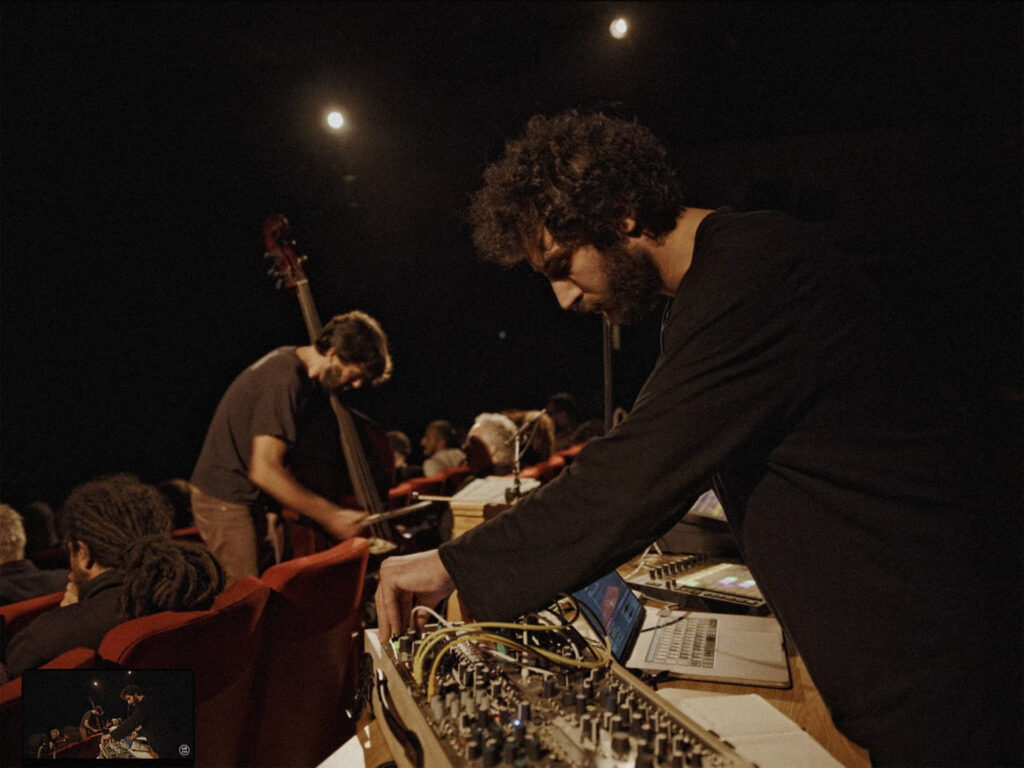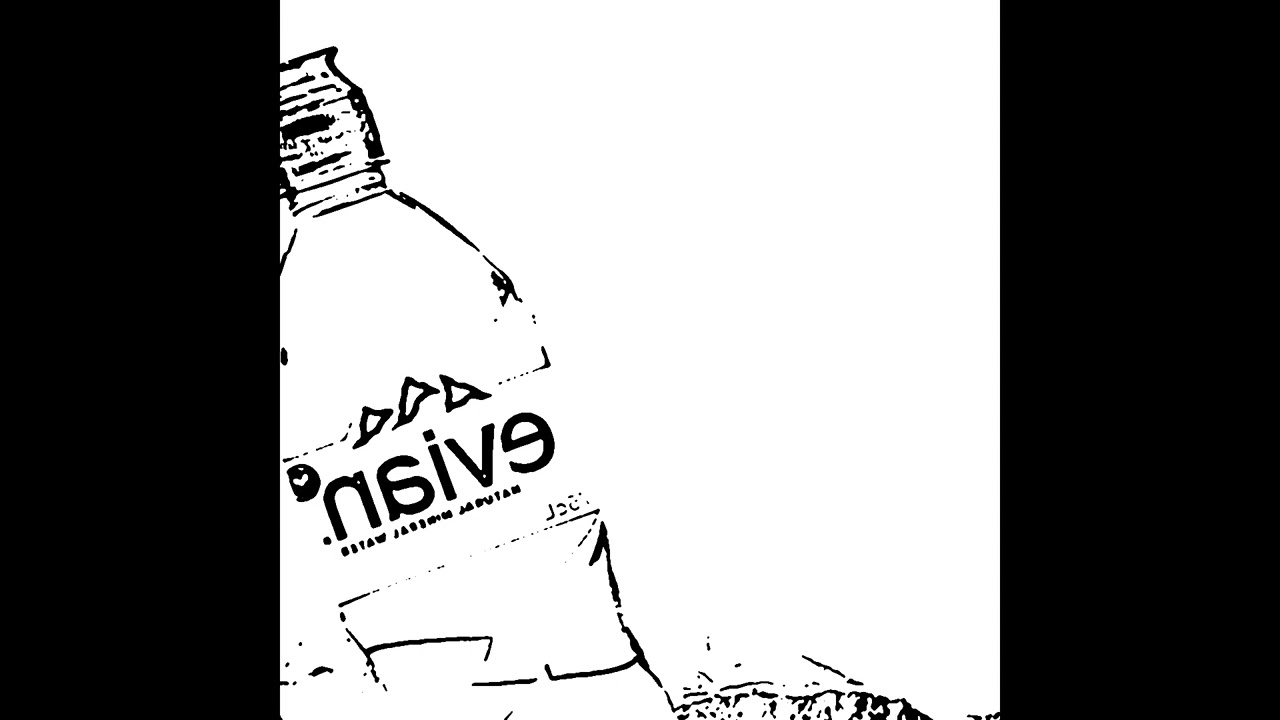‘C’est Parti !’, the first track on Antique Fantasia Vol. 4: Polonius II opens with patterns which proliferate in uncanny ways. Extra layers cascade in with a pop-up effect akin to new windows surprisingly but synchronously opening on a browser. This digital gait pervades Milan-based, Egyptian-born Seif Gaber’s music as Polonius. The compositions sound rooted in fingers playing a keyboard (whether QWERTY or ivory), but some of the keys are rogue and don’t make the sounds you’d expect, at the most extreme seemingly replaced with pitched up voices or irregular video-game sound effects. The compositions are elegant, there’s a worldliness in the polyrhythms and patterns that are the framework. But it also sounds like the hypnotic grace is being hacked by a mysterious prankster.
Polonius’ tape was released late last year alongside All The Gurls Were At The Women’s Archo Ashinto by Spool’s Out regulars Babau. Babau’s release uses similar tools to Polonius, but where the latter works in elegant if strangely coloured grids Babau’s is more like a pair of blurry sidelong montages. The pair of releases are part of a new series from Lyon-based label Bamboo Shows focusing on sunitty, “an Italian reinterpretation of Fourth World Music through the worldwide web”. Artists operating around this world have been covered in this column before, particularly through releases on Artetetra, the label run by Babau duo Luigi Monteanni and Matteo Pennesi.
The two releases are accompanied by mini-zines written by the artists fleshing out some of the ideas motivating what they do. Although the politics, concepts and sonics are different, there’s something reminiscent of Eddie Prévost’s writings situating AMM and free improvisation into a broader social and political context. A similar awareness that just because a type of music is strange doesn’t mean it exists in a vacuum.
Dense with information and concepts, the zines are equal parts cryptic and mischievous. A telling line comes with Monteanni and Pennesi’s explanation of sunitty, essentially portrayed as internet facing microsound and granular sampling. “If you don’t enjoy and smile at what you listen to, we consider it a bit of a failure.”
This playful experimentalism and awareness is what makes Polonius and Babau’s music so intriguing. A recurring theme through the tape world is artists working with everyday and diaristic sounds. In some ways Babau and Polonius are adjacent to that, but they’re aware that portable computers and a connection to the internet and the ensuing flood of sensory information that brings is a core part of the everyday for many. That’s the mundane they make fantastic.
Los Panteros24 RibsArchipel Editions / Aldarrax Editions / Famous Grapes Recordings
Los Panteros is the duo of Egyptian vocalist Aya Metwalli and Lebanese bassist Tony Elieh. 24 Ribs takes its name from an Egyptian proverb “If you take one of my ribs, I’ll grow 24 more.” At the core of these four tracks are bass and voice duets, but all around that sonorous bedrock erupts a coruscating soundscape of electronics, percussion and other stringed instruments. Metwalli’s background is in singing Egyptian classical music, over the years she’s embraced the microtones of Arabic scales and modes. Much of Elieh’s work has been around improvisation, drone and electro-acoustics. With Los Panteros, those lineages are platforms to escaping easy genre classifications. While grounded in beautiful songs, 24 Ribs relentlessly reaches beyond them. By the final track, Metwalli’s voice has been completely warped, while glitching polyrhythms coagulate in the electronics. Listening to the duo is to hear collaborative experimentation in action. Challenges to expectation inherent in Elieh and Metwalli’s dialogue.
DSPSSSSDOffcuts From RealityCourier
DSPSSSSD is a project of Aniruddha Das, who also produces music as Dhangsha. DSPSSSSD emerges out of that more prolific project, expanding on the non-metric passages which link together Dhangsha’s beat oriented tracks. While Dhangsha is far from baroque, the main difference to my ears is a greater embrace of minimalism in DSPSSSSD. Each track seems to focus on a single sample – degrading, flipping and mutating it before your ears. It’s a twitchy, insidious minimalism a far cry from ornate orchestral scores and concert halls. Disruptive rather than seductive, DSPSSSSD wields sound as a call to notice and a call to action. As the release notes explain, Offcuts From Reality strives to be “a frequency analysis of the emotional and political state of contemporary Britain,” Through DSPSSSSD’s distorted edges and irruptions of raw energy, the anxieties, frustrations and dread Das detects become audible and unignorable. Offcuts From Reality is precision engineered to unsettle. Head music that hits with the visceral urgency of a concrete floor on an icy day.
Pacific WalkerLost In The Valley Of The SunBluesanct
Pacific Walker play a form of trippy psych-folk so off its axel on Lost In The Valley Of The Sun that the vocals regularly sound like they’re playing at half-speed compared to the music. The suspicion that you’re listening to a zig-zagging ouroboros among the acoustic guitar, hypnagogic textures and blurred electronics gets confirmed with the reveal of the last song, when what came before returns and the previous seven tracks suddenly make new sense, like a Proustian memory in reverse. Pacific Walker’s sound world accumulates hazy layers in every direction to lushly colour the album’s sidewinding journey. Midway through, the vocalist declares through the haze “I’ve been a fish and a water molecule”. A line that tells you more about the temporalities Pacific Walker operate in than a review ever could.
Marianna Maruyama & Hessel VeldmanSaltStroom.tv
Marianna Maruyama and Hessel Veldman’s combination of spoken word and electronics on Salt is unusual for recordings in this lane because it feels like the text component leads the sonic rather than bending to it. Maruyama’s spoken-word pieces go from detailed biographical fragments into resonant poetic aphorisms, “none of us come from the place in which we live” one of many lines casually carrying synapse firing force. Dentistry and death, old friends and a job as a water cooler voice over artist are recalled and retold, Maruyama making every incidental detail profound. Veldman’s austere synths sprout up and around the poetry, acting as hyphens, colons or underlines to weave together what she’s saying. It means even the longer instrumental passages act like ellipses, holding the moment while we wait for Maruyama to return. With incredible subtlety they use words and sounds to trigger a gravity well.
Conal BlakeTwo SpeedFeedback Moves
Conal Blake’s Two Speed presents two interpretations of the same piece, combined into a whole. Specifically, ‘Accidental’ is a live recording which was inadvertently performed at half-speed. The B-side, ‘Intended’ is the same piece, recorded in the London-based artist’s home at the originally aimed-for speed. At the heart of the album are sounds taken from no-input mixing board sessions (that is, plugging inputs into outputs on a mixer to generate sounds), layered and arranged here with occasional flickers of drums placed on top. While the high-pitched tones opening the piece make their feedback origins clear, the sounds Blake gets from the machine broadcasting into itself become increasingly teeming in their post-industrial hues, his approach to no-input mixing falling neither into circuitous patterns nor walls of noise. A point of reference might be Rafael Toral’s Space series. While using different tools, Blake has a similar embrace for the chirping, whickering uncanny of feedback tones, their ability to almost sound like something familiar while also remaining utterly alien. The soundscape Blake makes from feedback is far icier and more metallic than Toral’s, but it’s just as rich. Two Speed might be sinister, but it’s an endlessly compelling place to inhabit.
Lawrence PerrierBrowseEveryday Samething
In the 1930s Walter Benjamin investigated the Paris Arcades and concluded their occupants had fallen into a waking dream under the spell of commodity fetishism. Lawrence Perrier elicits an adjacent stupour on Browse. The lyrics for the four tracks on this EP are all taken from online reviews for products such as bottled water and trainers. They’re morphed into sparse, downtempo dream pop underpinned with a particularly wobbly bass tone. For the first two tracks Perrier works alone, dead-panning the memoirs of transactions. For the final two, he’s joined by Aggie Rigg, her more melodious vocals adding an extra air of discombobulation. The album follows on from Hotline Hold Music 2022-2023. Browse is starker, spookier and lusher all at once. On paper, Perrier’s found text process might read like something Adam Bohman would do, but the fact Perrier’s music is so perversely beautiful makes it more unsettling. Carried on a swooning lethargy both comforting and slightly unwholesome, it becomes a waking dream polluted by the internet.
Julek PloskiGive Up ChannelMappa
A gun cocks and fires. What sounds like the voice of a cartoon character cries out then demands “stop”. The music, swooning and chiming, monetarily pauses before a roving synth line surges forward beneath Patrick Shiroishi’s soaring saxophone. On Julek Ploski’s Give Up Channel every moment is both dense and light as air. Where previous album, Hotel ***** was a hyperreal swarm, this latest is more measured but just as layered, moving from lush symphonic vistas to heroic trance synths, and on ‘J Maxwell’s Interlude Pt.1 (feat Yiki)’ a beautiful piano ballad. The tape’s accompanying notes suggest it emerges from a space of turmoil and hope, “deep solitude” and “prevailing”. The music’s borderless scope fits such conflict even if it doesn’t paint the specifics. Its contrasts are most explicit on ‘Espresso’, a joyous, bouncing synthetic choir interrupted by someone screaming profanities. The collaborators who appear over the course of the album, Shiroishi and Yiki as well as Martyna Basta and Zuzanna Bartoszek, only add to the cryptic depth. Ploski’s music is perfectly in tune with a world where multiple things demanding multiple responses are happening at once.
Annelies Monseré / GoldscammerAnnelies Monseré / GoldscammerHorn Of Plenty
Annelies Monseré and Goldscammer’s self-titled tape was released ahead of their joint tour through the UK in late 2024. For this release, the pair combine to reinterpret songs from Monseré’s previous solo releases. Her music is, perhaps surprisingly, well suited to this treatment. Monseré’s recordings typically build their own hermetically sealed and very specific worlds. The title track from last year’s I Sigh, I Resign used luminous organ and booming drums to give the impression it was marching from the netherworlds into a medieval village. Translated with Goldscammer to guitar and vocal duo, it still sounds like an apparition, but one which moves in a less martial way. Similarly, ‘One I Love’ mutates here from the original’s lonely piano lament to a morose, swaying folk-dance. The collaboration does more than bring a new voice into Monseré songs, it unearths the multitudes hiding in them. The words are the same, but the worlds are different.
RitunsiicLiepu Lapu LaipaSāpes Skaņas
Riga, Latvia-based ritunsiic, aka Aleksis Luriņš makes music which sounds like it was recorded everywhere other than a studio. At its core Liepu Lapu Laipa is a hip hop album, in the most space-time upsetting sense of the word. ‘Pēc Goa Mahabaleshwar’s pounding, fragmented beats and drifting synths suggest an intersection between one of Riga’s more brutalist suburbs and a desert. ‘Ulu Dong’ takes in a screwed pastoral edge, while ‘Kaut Ko Blandās, Kaut Ko Meklē’sounds like an impromptu acoustic guitar sing-along. That communal energy spills over into a different environment on following track, ‘Monkey Beach (Siltumnīcas Bērni)’, where rapper Fiņķis and singer ESTERE trade verses. Elsewhere we get sludgy guitar riffs and spoken word, what sounds like a classroom and trips into cracked beats and cutting freestyles. It could all risk being a little disjointed but ritunsiic’s production makes it cohere. A riotous montage of places and situations which defies the temptation to dwell and instead reaches ever outwards.
Tetsuya NakayamaEdo WanTsss Tapes
On Tetsuya Nakayama’s Edo Wan¸ water flutters its wings while metals trickle and splash. The details of human voices get lost in the din while incidental rustles and crackles hold the mic. Occasionally, melodic sounds enter, acting as incidental noise to the dance of liquids and surfaces. The tape captures mundane situations and settings, yet there’s something in the assembly of concrete and environmental sounds that re-enchants the ordinary. More than documenting their surroundings, the Chiba, Japan-based producer showcases a way of listening to what’s around. Water flowing at different rates and intensities becomes as much of an occasion as musical notes. It chimes with lower case music, but Nakayama’s elegant prose of discrete sounds holds time like a sentence cut short.
Domiziano Maselli / Tommaso RolandoEnjoy Country MusicTorto Editions
Tommaso Rolando and Domiziano Maselli’s Enjoy Country Music was recorded in a vast, reverb-soaked warehouse that they’d filled with microphones and speakers. Maselli plays modular synths, amps and a 15 metre tape loop, Rolando plays double bass. But the magic with this is how they toy with proximity and space. Creative microphone placement and amplification are as much a part of these compositions as the playing. It opens with a cathartic deluge, electronics roaring while double bass saws. But this is just an overture that establishes where they are and what they’re working with. Enjoy Country Music is at its most effective when borders between warehouse, instruments and post-production dissolve and they start bending and extending each other. How, on ‘From The River’ a sinister bass line shuffles through dead air and then that air suddenly hits back. The way a whirring tape loop fuses with bowed strings on ‘Static, or the perception of God I’. The wobbly cybernetic glissandos on ‘Broken Speaker’. Enjoy Country Music gets bigger the closer you listen.




